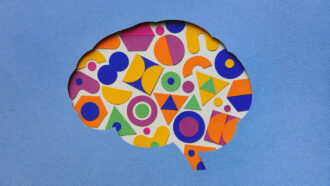Brain
-

-
 Health & Medicine
Health & MedicineNew brain scans may show if a concussion has not yet healed
Concussions change certain brain waves, and delta waves may be the best signs of when teens can return to competitive sports.
-
 Computing
ComputingSleep helps AI models learn new things without forgetting old ones
Breaks in training meant to mimic human sleep helped artificial intelligence learn multiple tasks.
-
 Brain
BrainThe pandemic prematurely aged teens’ brains
A small study showed certain structural changes that appeared three to four years early. Normally, premature aging of the brain is not a good sign.
By Freda Kreier -
 Brain
BrainSome screen time may aid kids’ recovery from concussions
A few hours a day on digital devices may actually aid recovery by connecting kids with friends and giving their brains some stimulation.
-
 Brain
BrainPlaying video games may improve your memory and attention
The biggest research study of its kind finds that video gamers perform better on some mental tasks than nongamers do.
-
 Brain
BrainLet’s learn about creativity
By reading brain scans and eavesdropping on brainwaves, scientists are learning more about how creativity works.
-
 Brain
BrainScientists Say: Glymphatic System
The glymphatic system bathes the brain in cleansing fluids during sleep and clears away harmful cellular waste.
-
 Brain
BrainScientists Say: Cognition
Cognition is involved in all conscious mental activity, from thinking and reasoning to remembering.
-
 Brain
BrainLet’s learn about reading
Reading can be fun — but it can also be really hard. New research is exploring how to make reading easier for people of all ability levels.
-
 Brain
BrainWhy teens can’t help tuning out mom’s voice
Teens often tune out what their mom is saying. Normal brain changes during adolescence could explain why, new research shows.
-
 Humans
HumansLet’s learn about sleep
Sleep is key for health and wellbeing — but early school start times and screen time make it harder for teens to get shuteye.